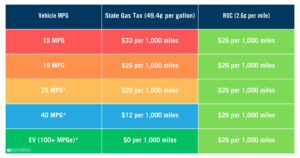OLYMPIA, Wash. – Rep. Jake Fey, D-Tacoma, Chair of the House Transportation Committee, has introduced legislation (HB 1921) to establish a Road Usage Charge (RUC), a fair and sustainable way to fund Washington’s transportation system as gas tax revenue declines.
“For over a century the gas tax has served as a user fee, funding our roads and bridges. With more fuel-efficient and electric vehicles, that revenue is disappearing,” said Fey. “The RUC ensures that all drivers contribute fairly by paying for their road usage, rather than paying by the gallon of gas they consume.”
Why Washington Needs a RUC
- Gas tax revenue funds more than a third of the state’s transportation budget ($1.3B annually).
- Without action, gas tax revenue will decline by over 70 percent by 2050, leaving roads significantly underfunded.
- Without a RUC, the gas tax would need to nearly quadruple to $2 per gallon by 2050, just to maintain current revenue levels.
How RUC Works
Washington will gradually transition to a road usage charge system over the next ten years, starting with passenger vehicles under 10,000 pounds:
- Phase 1 (2027-2029): Voluntary for EV and hybrid drivers (registration fees waived).
- Phase 2 (2029-2031): Mandatory for EVs/hybrids; voluntary for fuel-efficient gas vehicles (20+ mpg).
- Phase 3 (2031-2035): Mandatory for all gas vehicles with 20+ mpg. Beginning July 2031 – 2035, fuel-efficient car will be phased in from most to least fuel-efficient
- Rate: 2.6 cents per mile (adjusted periodically to match gas tax revenue).
- Annual Odometer Reporting: Self-reporting required starting in 2026; GPS tracking is optional.
- Gas Tax Credit: Drivers pay either RUC or gas tax, not both—gas tax already paid will be credited.
- Standard Mileage Deduction: All vehicles will receive a standard deduction of 200 miles each year off of their road charges.
Addressing Common Concerns
- Does RUC require drivers to report their driving location? No. Only annual total miles driven is required. Odometer mileage can be self-reported.
- Does RUC require drivers to install technology in their cars? No. Technology including GPS is strictly optional.
- Will rural drivers pay more than urban drivers? No. All vehicles pay the same per-mile rate of 2.6 cents/mile. (See table below – click to enlarge).
- Does RUC discourage EVs? No. EV and hybrid drivers will still save money by buying less gasoline. And they will no longer pay the annual $225 EV or $75 hybrid registration fees.
*EV/Hybrid owners who opt in will no longer pay $225/$75 annual registration fees.
Revenue & Road Improvements
- RUC funds are protected under the 18th Amendment for road maintenance & preservation.
- A 10 percent assessment on RUC fees will fund multimodal transportation (rail, transit, pedestrian, bicycle).
Lessons from Other States
Washington joins a growing number of states working to modernize road funding:
- Oregon (OReGO): Over 2,000 have participated since 2015. RUC participants receive gas tax credits and additional registration fees on EVs and high-MPG vehicles are waived.
- Utah (RUC): Voluntary RUC program since 2020, allowing EV drivers to choose between a flat fee or per-mile charge.
- Virginia (Mileage Choice): Voluntary RUC program since 2022, allowing drivers of fuel efficient, hybrid or EVs.
- Hawaii (HiRUC): Begins in 2025 for EVs with a plan to extend RUC to all vehicles by 2033, under an approach that ensures fairness for rural and long-distance drivers.
Quotes from Partners
“This proposal is a win for Washington. It creates a new revenue source for transit, biking, and walking investments while committing to repair and rebuild our streets to make safe, connected communities with great transit. We commend Representative Fey for his leadership in putting this bill forward and making Washington a national leader on transportation,” said Kirk Hovenkotter, Executive Director at Transportation Choices Coalition.
“We’ve devoted over a decade to driver-focused research on road usage charging in Washington. It has shown that road usage charging is viable and a fairer alternative to the gas tax as a way to pay for our roads and bridges.” said Debbie Young, Chair of the Washington State Transportation Commission. “It will take time to transition to a road usage charge, so we are pleased to see Rep. Fey advance this thorough legislation.”
What’s Next?
The bill now moves to the House Transportation Committee for hearings and public input. Representative Fey is available for a conversation with media professionals Tuesday, February 11 from 12:30-1:30 p.m. on TVW and in the House Rules Room (Legislative Building). A Teams option is available for media professionals, please email Stephanie Davidsmeyer (stephanie.davidsmeyer@leg.wa.gov) to get the link.
For more information about HB 1921, visit the bill page: https://app.leg.wa.gov/billsummary/?BillNumber=1921&Year=2025&Initiative=false
TVW link: https://www.tvw.org/watch/?clientID=9375922947&eventID=2025021309
Media Contact:
Stephanie Davidsmeyer
(360) 786-1528
stephanie.davidsmeyer@leg.wa.gov

